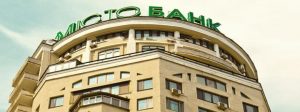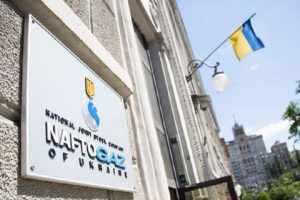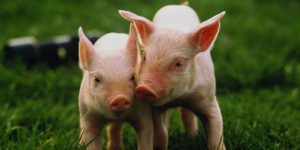
The National Bank of Ukraine (NBU) on January 26 made a decision to revoke the banking license and liquidate Misto Bank (Odesa), according to the regulator’s website on Wednesday.
“The NBU, at the suggestion of the Deposit Guarantee Fund, made a decision dated January 26, 2021 No. 25-RSh to revoke the banking license and liquidate Misto Bank,” the message said.
As reported, on December 14, the NBU classified Misto Bank as insolvent due to a decrease in capital ratios by 50% or more from the minimum established level due to the loss of one of its main assets – a soybean processing plant in Kherson region, with a book value of over UAH 271 million, or almost 17% of all bank assets.
Misto Bank was founded in 1993. According to the NBU, as of January 1, 2020, the main shareholders of the financial institution were Fursin, who directly and indirectly owned 97.180668% of the bank’s shares, and Latvian citizen Igor Buimister with 1.811499%.
As of October 1, 2020, the bank ranked 53rd in terms of total assets (UAH 1.498 billion) among 74 banks operating in the country, the press service of the central bank said on Monday.

Ukrainian enterprises operating in the field of hospitality and creative industries lost more than UAH 83 billion in the nine months of 2020 due to the coronavirus pandemic, Kyrylo Kryvolap, the coordinator of the working group on the development of the National Economic Strategy until 2030, has said.
“These are actually the numbers that make up our GDP losses last year due to the impact of the coronavirus crisis,” Kryvolap said during a public discussion of the draft National Economic Strategy 2030.
He also clarified that in one weekend, the losses of these industries can be up to UAH 1-1.5 million.
“In this sector, there may be about 100,000 jobs at risk, including 50,000 self-employed,” the economist said.
Kryvolap also added that the recovery of these industries is slow due to the migration of labor to other, more secure areas.

Representatives of the Naftogaz Group along with the Institute for Partnership and Sustainable Development, on Tuesday at Interfax-Ukraine, announced the start of the Development Energy Grant Competition for the selection of 50 projects of territorial communities and the allocation of UAH 100,000 to them.
“Communities need a modern and high-quality tool that will allow them to develop, to implement development projects that will contribute to the sustainable development of the community and the entire region. It is also interesting and important for us when our regions of production are developing in parallel with our company or at the level,” head of the regional development projects department of JSC Ukrgazvydobuvannia of the Naftogaz group Vitaliy Chudak said.
According to him, this issue is relevant today due to the completion of the processes of decentralization and the increase of local responsibility.
Chudak also said the projects should aim to achieve one of three sustainable development goals: good health and well-being, quality education and sustainable development of cities and communities.
“The common goal is the development of those communities with which we will work, setting benchmarks for other communities that will be familiar with successful implementation cases,” head of the NGO Institute for Partnership and Sustainable Development, project management and fundraising expert Daria Mustafina said.
According to her, this competition is a good example of introducing a close connection between business, government and society and their interaction for a common goal.
The organizers of the competition said that 242 communities from 11 regions of Ukraine are already participating in its first stage, which will last until February 20, of which 90 will move on to the next stage. Six months are allotted for the implementation of the winning projects, and the presentation of the finished projects is scheduled for the end of October 2021.

Ukrainian transport companies, as well as part of the JFO zone) reduced the cargo transportation by 11.2% in 2020 compared to 2019, to 600 million tonnes, the State Statistics Service said.
According to it, in 2020, the cargo turnover of carriers decreased by 14.3%, to 290.3 billion tonne-kilometers.
According to statistics, in 2020, some 305.5 million tonnes of cargo were transported by rail in domestic traffic and for export, which is 2.4% less than in 2019. Some 191.3 million tonnes (less by 21.7%) were transported by road, 5.6 million tonnes (less by 8.3%) by water transport, 97.5 million tonnes (less by 13.5%) by pipelines, and 100,000 tonnes (less by 6.7%) by air.

President of Ukraine Volodymyr Zelensky commends the adoption of the law “On democracy through the nationwide referendum” (draft law No. 3612) by the Verkhovna Rada, the presidential press service reported.
“Now Ukrainians will be involved in practice in making important decisions for the country, and the government will be forced to listen to the will of the people. The referendum is an important tool for expanding democracy in Ukraine,” the President stressed.
Zelensky noted that the adoption of the relevant law was one of the important points of his election campaign during the presidential elections, as the document makes the dialogue between the government and society clearer.
It has been determined that the following issues cannot be the subject of the nationwide referendum:
– those contrary to the provisions of the Constitution of Ukraine, generally recognized principles and norms of international law, enshrined primarily in the Universal Declaration of Human Rights, the Convention for the Protection of Human Rights and Fundamental Freedoms, protocols thereto;
– those abolishing or restricting the constitutional rights and freedoms of man and citizen and guarantees of their realization;
– those aimed at eliminating the independence of Ukraine, violating the state sovereignty, territorial integrity of Ukraine, creating a threat to the national security of Ukraine, inciting interethnic, racial, religious hatred;
– those related to taxes, budget, amnesty;
– those referred by the Constitution and laws of Ukraine to the jurisdiction of the law enforcement agencies, the prosecutor’s office or the court.

KSG Agro agricultural holding has agreed on possible cooperation with Swiss Suisag in terms of purchasing and using Suisag genetics sows and providing advice on pig breeding technologies, the holding said.
“The parties set indicative deadlines for signing relevant documents׃ memorandum and contracts. This should happen in the first half of 2021,” according to a press release following the visit of Suisag CFO Matteo Aepril and Chief Veterinarian Stefanie Klausmann to Ukraine.
Chairman of the Board of Directors of KSG Agro Serhiy Kasianov also said that the holding’s pig farm in Nyva Trudova (Dnipropetrovsk region) has started the process of renewal and rejuvenation of the pig herd and about 1,000 sows of Danish Dunbred genetics will be purchased under the project in 2021.
The vertically integrated holding KSG Agro is engaged in pig breeding and production, storage, processing and sale of grain and oilseeds. In January-September 2020, the agricultural holding received $4.77 million in net profit, which is 52% less than in the same period in 2019, and revenue decreased by 17%, to $14.67 million.